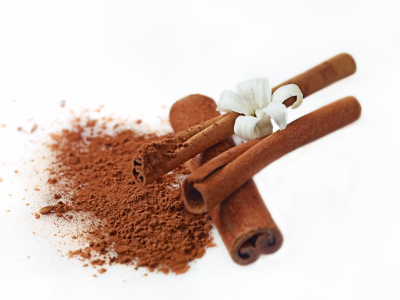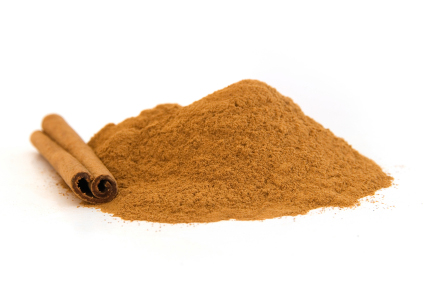The Amazing Benefits of Cinnamon
As I am sure most of you have heard, diabetes is rapidly becoming an epidemic not only in the US, but worldwide. Diabetes can affect people of all ages, and it can increase the risk of cardiovascular diseases, vascular complications and amputations, blindness, immune suppression, kidney disease, Alzheimer’s disease and more.
Finding ways to prevent and treat diabetes has become a large area of focus in research, and some interesting findings have been made. As much as there are a lot of drugs and medications that can help diabetics control their blood sugar (as well as changes in diet, exercise and weight loss) some foods have actually been found to assist in blood glucose control and insulin sensitivity as well, namely – cinnamon.

Cinnamon is native to Sri Lanka and India, as well as being cultivated in areas of Africa, southeastern India, Indonesia and a few others. Cinnamon is widely used for culinary and medicinal purposes around the world, and current research is finally catching up, finding all sorts of benefits from its consumption.
A recent study was performed to determine how well cinnamon could affect blood glucose as well as blood pressure in 58 middle-aged type 2 diabetics. These patients either consumed a placebo or 2 grams of cinnamon (about 1 tsp) daily for 12 weeks. The results were that both the systolic and diastolic blood pressure of people consuming cinnamon were significantly reduced (very important for diabetics), as well significant reductions in fasting glucose, waist circumference and body fat mass in the cinnamon group compared to the placebo group. One other interesting piece the researchers looked at was the patients HbA1c levels.
HbA1c is a measure of glycosylated hemoglobin. Glycosylated hemoglobin is a molecule in your blood cells that forms when blood sugar attaches to hemoglobin (a protein in your red blood cells). And since red blood cells live for about 3 months, this test can give a good estimate of a person’s blood sugar over a 3 month span, which also happened to be the length of the study. In these patients HbA1c was significantly lowered in the cinnamon group, showing that its consumption improved their blood glucose not only on from acute intake, but over the long-term as well. This is incredibly important because cinnamon research has shown that its consumption can improve the insulin and blood sugar response at the exact meal it is eaten, but this shows that its consumption can significantly improve your blood sugar control overall and over the long-term.
Another recent study looked at a larger and more diverse population, with 109 type 2 diabetic children, adults and elderly patients. The patients were divided into two groups – one receiving standard diabetic treatment, the other receiving standard diabetic treatment along with 1g of cinnamon daily for three months. The group treated with cinnamon significantly reduced HbA1c levels more than standard diabetic treatment alone. They improved their HbA1c levels by almost a full percentage point!
So we know that daily cinnamon consumption has been shown to decrease blood pressure, waist circumference, fasting glucose and HbA1c levels in diabetics of all ages. These are phenomenal results, but what about cinnamon’s effects on the non-diabetic population? Glad you asked.
In 2009 Scandinavian researchers performed cinnamon research on 15 young, lean and non-diabetic participants. These healthy participants were randomly assigned to consume rice pudding without cinnamon, or with 1g or 3g of cinnamon respectively. It was found that the group that consumed 3g of cinnamon had significantly lower levels of insulin after the meal than the other groups, indicating that cinnamon can acutely decrease the insulin response of food consumption even in healthy persons, not just diabetics.
In conclusion, cinnamon has been used as a spice and a traditional medicine for hundreds of years. The research on its uses and benefits is growing daily. There is a large amount of in vitro (meaning in test tubes) studies that have demonstrated cinnamon’s ability to imitate insulin, enhance the effectiveness of insulin, and to improve blood sugar metabolism. On top of that there are a lot of animal in vivo (meaning done on living animals) studies that have found cinnamon to help control blood sugar and the insulin response.

While the number of well-controlled clinical trials on humans is not enough to make definitive statements about cinnamon’s health properties yet, the research is growing (and we discussed some of the best data in this article). Research is finding that cinnamon has the ability to improve blood glucose control, improve insulin sensitivity as well as improve blood pressure and potentially aid in weight loss in diabetics and healthy people alike.
Consuming just 1 tsp per day may significantly improve your body’s glucose metabolism and insulin sensitivity, and may decrease your blood pressure and body fat to boot!
NEXT: Quite Possibly The Most Important Discovery In Weight Loss In the Last 50 Years >>
Resources
Akilen R, Tsiami A, Devendra D, et al. Glycated haemoglobin and blood pressure-lowering effect of cinnamon in multi-ethnic Type 2 diabetic patients in the UK: a randomized, placebo-controlled, double-blind clinical trial. Diabet Med. Oct2010;27(10):1159-67.
Crawford P. Effectiveness of cinnamon for lowering hemoglobin A1C in patients with type 2 diabetes: a randomized, controlled trial. J Am Board Fam Med. 2009;22(5):507-12.
Hlebowicz J, Hlebowicz A, Lindstedt S, et al. Effects of 1 and 3 g cinnamon on gastric emptying, satiety, and postprandial blood glucose, insulin, glucose-dependent insulinotropic polypeptide, glucagon-like peptide-1, and ghrelin concentrations in healthy subjects. Am J Clin Nutr. 2009:89(3):815-21.
Couturier K, Batandier C, Awada M, Hininger-Favier I, Canini F, Anderson RA, Leverve X, Roussel AM. Cinnamon improves insulin sensitivity and alters the body composition in an animal model of the metabolic syndrome. Arch Biochem Biophys. 2010 Sep 1;501(1):158-61.
Gruenwald J, Freder J, Armbruester N. Cinnamon and health. Crit Rev Food Sci Nutr. 2010 Oct;50(9):822-34.
About Jayson Hunter & Jaylab Pro

Jaylab Pro was founded by Registered Dietitian Jayson Hunter. Jayson has been recognized as one of America's foremost weight loss experts by America's Premier Experts™. He has also been featured in USA Today for this accomplishment. Jayson is also a best-selling author having co-authored multiple books in health & fitness and business growth. Jayson and the Jaylab Pro team are proud to create content that helps improve the lives of millions of people around the world. We hope you enjoy it just as much as others have.
 If you order a JayLabPro SmartShip product or any Combo Package, we will automatically ship you a new supply of the product or products you have ordered every month, starting 30 days after your initial order is shipped, and continuing until you cancel. The credit card you are using today will be billed the lowest available price for those product or products when your order is shipped, but shipping will be FREE. You may log into your customer account or call our customer service department toll-free at 1-888-9GETPRO (1-888-943-8776) between the hours of 8am – 9pm EST Mon-Fri to cancel future shipments, customize the timing of your shipments, or change the credit card used for billing.
If you order a JayLabPro SmartShip product or any Combo Package, we will automatically ship you a new supply of the product or products you have ordered every month, starting 30 days after your initial order is shipped, and continuing until you cancel. The credit card you are using today will be billed the lowest available price for those product or products when your order is shipped, but shipping will be FREE. You may log into your customer account or call our customer service department toll-free at 1-888-9GETPRO (1-888-943-8776) between the hours of 8am – 9pm EST Mon-Fri to cancel future shipments, customize the timing of your shipments, or change the credit card used for billing.










